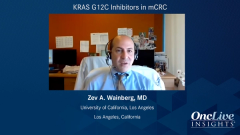
Supplements and Featured Publications
- My Treatment Approach: Colorectal Cancer
- Volume 1
- Issue 1
Molecular Testing in Metastatic Colorectal Cancer
The significance of studying genomics in metastatic colorectal cancer and an overview of actionable targets that can be tested for to help in treatment decisions for newly diagnosed disease.
Episodes in this series

Zev A. Wainberg, MD: There’ve been a number of studies published on the genomic differences. As far as I can tell, I don’t know if you have seen anything different, it’s not clear that they represent a distinct genomic subgroup that is altogether too different from your otherwise older patients who develop metastatic colorectal cancer. But I know there a lot of studies and efforts looking at that.
Jaffer A. Ajani, MD: It’s going to be a big challenge for younger investigators to figure this out. It will have to be multiple types of interrogations to get a handle on this. And even if you figure it out, it’s going to be hard to motivate younger people to use an early detection strategy. At least checking for a KRAS mutation in the blood, or maybe a combination of 2 or 3 biomarkers, may be able to help us.
Zev A. Wainberg, MD: It’s going to be a multipronged approach trying to figure out why this phenomenon is occurring. As it relates to treatment, usually our tendency is to think that the younger patients can handle the more intense therapies, and that’s often true. But we’re learning now that many patients who are well into their 70s can handle intense combination chemotherapies as well. Age isn’t the only factor, of course. But Dr Ajani, if we talk about molecular testing in colon cancer, it’s a little different than gastric cancer, I suppose, since it is a whole different panel that is usually sent. Besides looking for KRAS and RAS status, is there anything else you regard as critical?
Jaffer A. Ajani, MD: The NCCN [National Comprehensive Cancer Network] also has recommended HER2 testing, microsatellite status, NRAS is creeping in, BRAF, as you mentioned. One that is not included right now is the liquid biopsy, which probably will become routine as we go forward, especially if the platform gets larger. But colon cancer is ahead of other GI [gastrointestinal] tumors in a larger panel of biomarkers that are becoming rather standard and actionable.
Zev A. Wainberg, MD: Most institutions, and I’m sure your institution and ours, have a large internal panel, which includes MSS [microsatellite stability] status, KRAS, NRAS, and BRAF. And now, I totally agree with you, just like in gastric cancer, we now see HER2 make its way into the NCCN guidelines. Even with a number of anti-HER2 agents showing activity, particularly in RAS wild-type tumors with both novel agents, such as DS-8201, but also combination therapies—pertuzumab and trastuzumab, trastuzumab and tucatinib, you name it—there is some element of encouraging response rate here. I do tend to check HER2 as well in every patient, particularly those who are KRAS wild type.
Transcript Edited for Clarity
Articles in this issue
over 4 years ago
Anti-EGFR/Chemo Combos Allow for Tailored Approach in mCRCover 4 years ago
Biweekly Cetuximab Offers a Convenient Dosing Option in mCRCover 4 years ago
Genomics, Sidedness Guide Treatment Selection in Metastatic CRCover 4 years ago
KRAS G12C Inhibitors in mCRCover 4 years ago
Future Directions in mCRCover 4 years ago
EGFR Therapy for mCRC: Dermatologic Toxicityover 4 years ago
Later-Line Treatment Options for mCRCover 4 years ago
Sequencing Anti-EGFR Therapy in mCRCover 4 years ago
Changes in Cetuximab Dosing Schedule in mCRC












































